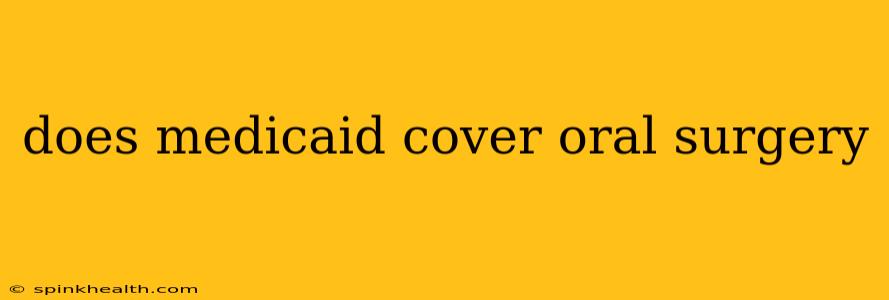Does Medicaid Cover Oral Surgery? Navigating the World of Dental Coverage
The question, "Does Medicaid cover oral surgery?" is a common one, filled with understandable anxiety. Facing the prospect of oral surgery is stressful enough, without the added worry of how to pay for it. The answer, unfortunately, isn't a simple yes or no. Medicaid's coverage of oral surgery varies significantly depending on your state, your specific procedure, and your individual circumstances. Let's delve into the complexities to shed some light on this important topic.
Imagine Sarah, a single mother working two part-time jobs. She recently experienced severe tooth pain, and after a visit to the dentist, learned she needs an impacted wisdom tooth removed – a fairly common oral surgery. Sarah's worried – can she afford this? Does her Medicaid coverage help?
This is where the nuances come in. While Medicaid aims to provide essential healthcare, including dental care for children, the specifics of what's covered for adults differ vastly across states.
What Does Medicaid Typically Cover?
Medicaid programs generally aim to cover medically necessary dental services for children and pregnant women. This can often include preventative care, like cleanings and fillings. However, the inclusion of oral surgery falls into a more gray area.
Generally, Medicaid is more likely to cover oral surgery deemed medically necessary, rather than elective procedures. This means procedures required to address immediate health risks, like infections, jaw fractures, or those directly related to other health conditions, tend to have a higher chance of approval. Elective procedures, such as purely cosmetic surgeries, are less likely to be covered.
What Types of Oral Surgery Might Be Covered?
The type of oral surgery greatly influences coverage. Some examples of procedures that might be covered under certain state Medicaid programs include:
- Extractions of severely decayed or infected teeth: If a tooth is beyond repair and poses a health risk, extraction might be covered.
- Treatment of oral injuries: Injuries sustained in an accident may necessitate oral surgery to repair fractures or other damage. This is more likely to be covered.
- Surgical treatment of oral infections: Severe infections that require surgical intervention to drain abscesses or remove infected tissue could be covered.
- Treatment of impacted wisdom teeth: While this is less guaranteed, if the impacted wisdom teeth are causing significant problems like infection or pain, coverage is more likely.
What Types of Oral Surgery Are Less Likely To Be Covered?
On the other hand, these types of oral surgeries are less likely to be covered by Medicaid:
- Impacted wisdom teeth extraction without clear medical necessity: Simply wanting wisdom teeth removed for cosmetic reasons, or because they're slightly impacted without causing problems, may not meet the criteria.
- Elective procedures for cosmetic improvements: Procedures solely aimed at enhancing appearance, such as dental implants for purely aesthetic reasons, are generally not covered.
- Complex, specialized surgeries: Some highly specialized oral surgery procedures might not be available or covered by all Medicaid programs.
How Can I Find Out What My Medicaid Plan Covers?
This is the crucial step! Don't rely on generalizations. Contact your state's Medicaid office directly. They can provide you with the specifics of your state's plan and what dental procedures, including oral surgery, are covered. You can also contact your dentist's office; they can often help you navigate the process of verifying coverage.
What Happens if My Oral Surgery Isn't Covered?
If your procedure isn't covered, explore options like payment plans offered by your dentist or look into dental financing options. There might also be local charities or non-profit organizations in your area that offer financial assistance for dental care.
Does Medicaid Cover Dental Implants?
This is another frequently asked question. The short answer is generally no, unless they are part of a larger, medically necessary procedure. Medicaid typically focuses on basic dental care and procedures directly addressing health issues.
In conclusion, Sarah's situation, like many others, hinges on the specifics of her state's Medicaid program and the medical necessity of her surgery. Proactive communication with your state's Medicaid office and your dentist is paramount to understanding your coverage and preparing for the financial aspect of your oral surgery. Don't hesitate to ask questions and explore all available options. Remember, navigating healthcare can be challenging, but information is your greatest ally.

